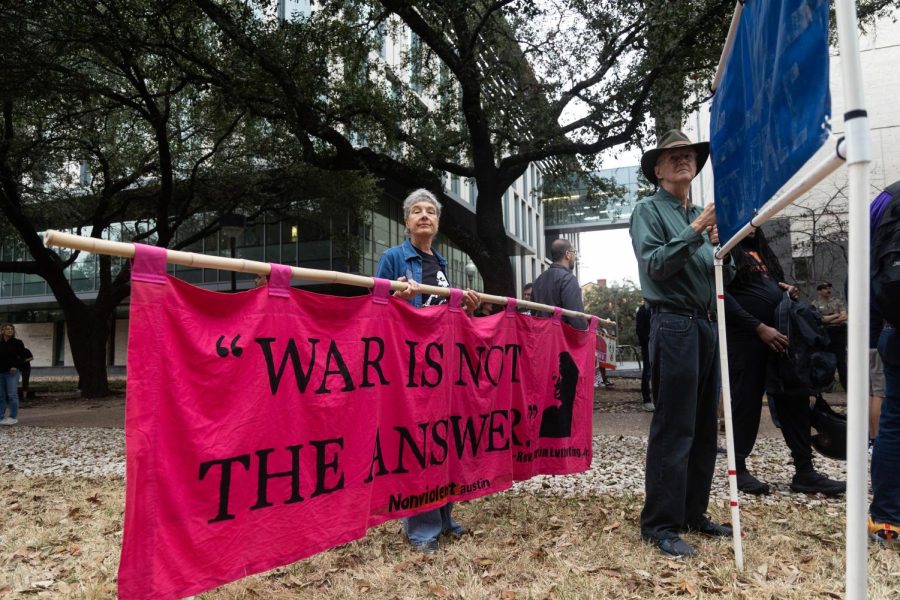Austin community gathers, commemorating Dr. MLK Jr. legacy
January 16, 2023
With his camera in hand, Gabriel C. Letcher scans the crowd, hoping to capture powerful moments from Austin’s MLK Celebration.
“To see the ability to get people from several different organizations and companies to honor the vision of a man who passed so many years ago — there’s nothing like it,” Letcher, a radio-television-film sophomore, said.
Letcher, a member of the Epsilon Iota Chapter of Alpha Phi Alpha Fraternity, Inc., said he joined the historically Black fraternity because it leads with community service. By volunteering to film the MLK Celebration, Letcher embraced the opportunity to amplify the event’s impact.
“(It was important) to document community service but also to multiply the audience that this event reaches,” Letcher said. “When you find an event to be powerful, you want it to be seen by as many people as possible.”
Marking its 30th anniversary and return since COVID-19, the MLK Celebration, sponsored by the Austin Area Heritage Council, gathered thousands of attendees to commemorate the legacy of Dr. Martin Luther King Jr. on Monday. Beginning with a program at the MLK statue on campus, the event continued with a march to the Capitol. After speeches by community leaders and elected officials, attendees marched to a festival at Huston-Tillotson University, which featured local vendors, organization booths and musical performances.
Along with Alpha Phi Alpha Fraternity, Inc., members of the other eight sororities and fraternities within the National Pan-Hellenic Council attended the celebration, including Dr. Soncia Reagins-Lilly, vice president for student affairs and dean of students at UT. Wearing a pink and green jacket, Reagins-Lilly, a triple legacy of Alpha Kappa Alpha Sorority, Inc., said sporting her sorority colors reminds her of a sisterhood she holds close.
“Being a member of Alpha Kappa Alpha symbolizes that we must continue to forge on, be the drum majors and continue the fight for all people to have equality and recognize those who don’t,” Reagins-Lilly said.
With Reagins-Lilly’s daughter attending UT and her son being a graduate from King’s alma mater, Morehouse College, Reagins-Lilly said her family’s legacy represents key aspects celebrated at the event, including progress and perseverance.
“Martin Luther King Jr. represents so much for the African American Black community, as well as the human race,” Reagins-Lilly said. “His dedication, commitment, hard work and sacrifice contribute greatly to where we are today.”
Multiple community leaders and elected officials spoke on the steps of the Capitol, including Austin City Council member Natasha Harper-Madison, who represents District 1.
During her address, Harper-Madison said King and other liberatory figures allowed her to be extraordinary as a dark-skinned Black woman. Emphasizing the importance of community support, Harper-Madison asked those in the crowd who identified as dark-skinned Black women to raise their hands.
“Do you see those women who raised their hands? She is the final piece to every puzzle,” Harper-Madison said during her speech. “She is the one who has had to dream bigger, fight harder and withstand more. Lift her up (and) support her, but never forget that protection of her does not mean saving her. It means fighting against injustice and being bold in your stance against anti-Blackness.”
Among those who raised their hands was UT Student Government vice president Isabel Agbassi, who said events like the MLK Celebration provide a time to remember the reality of life on campus for Black students.
“It’s really important for everyone to go to community events like this to remember that for a lot of us, being on campus is like a protest, especially for Black students,” Agbassi, a public health junior, said. “The last time King came (to campus), he came to advocate against segregation. That’s recent history.”
Dr. Melva Williams, Huston-Tillotson president and CEO, echoed Agbassi’s sentiment of the need for increased efforts to eradicate injustice, not just on college campuses, but also across Austin.
“When you know in your heart of hearts you have the ability to challenge the status quo, don’t wait,” Williams said during her speech. “Just imagine me standing right next to you saying
‘You go first.’ Austin, Texas, you have come a long way, but there is more work for you to do.”
Following the Capitol program, the crowd made their way to Huston-Tillotson for the festival. Participating vendors included Ebony Cherrelle, who owns June & Sage. Co., a Georgetown-based herbal wellness shop selling handmade skin and body care.
“I like to give back to my community, teaching them to provide wellness to (themselves), finding clean products for Black and brown people of color,” Cherrelle said. “I tend to be in all those spaces to provide options or have education on what is meaningful, using clean skincare or herbs as an alternative or holistic method.”
Other vendors, such as Raniece Dorsey, who creates jewelry through her brand Craft Princess, traveled four hours from Port Arthur to participate in the festival. Wearing yellow earrings to symbolize happiness, Dorsey said without King’s legacy, she would not be able to run her own business.
“All the jewelry is created with different colors meant to empower (and provide) a positive affirmation throughout the day,” Dorsey said.
From Cherrelle’s goals of providing holistic care to Dorsey’s aim to empower, the festival’s vendors reiterate the event’s purpose of highlighting King’s legacy.
“Martin Luther King, Jr.’s legacy stands for and represents togetherness, unity, equality, diversity, inclusion (and) fairness,” Reagins-Lilly said. “It’s fundamental to the work we do, to higher education, America and the world.”



